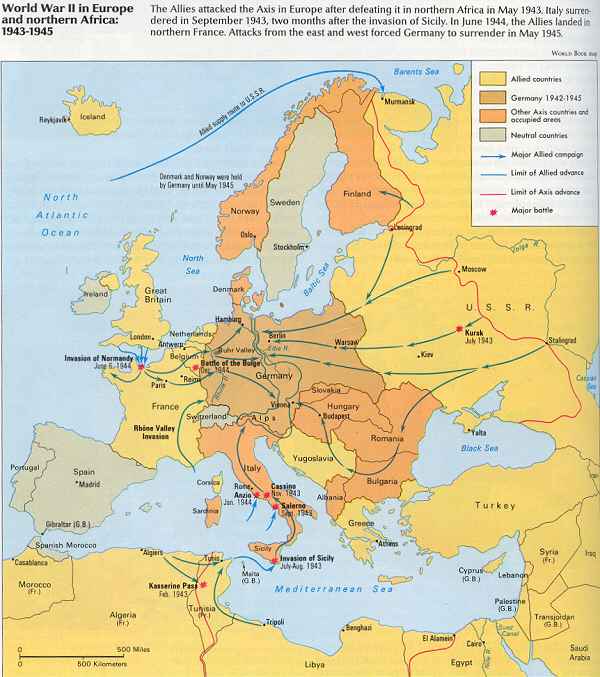
April 13
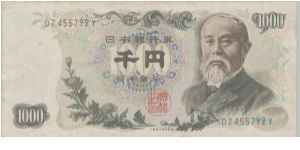
1882 Japan: Itō Hirobumi and a large delegation of Japanese lawmakers, in preparation for writing a draft constitution, travel overseas to study the system of government in Bismarck's Germany. [See: Countdown to Infamy: Timeline to Pearl Harbor.]
1892 Various:
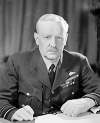
Birth: Arthur Travers Harris—commonly known as "Bomber" Harris, and often within the RAF as "Butcher" Harris—was commander of RAF Bomber Command and later a Marshal of the Royal Air Force during the latter half of World War II. In 1942 the Cabinet agreed to the aerial bombing of German cities by carpet bombing. Harris implemented the policy vigorously and encouraged the development of tactics and technology to perform the task more effectively. Harris's preference for strategic area bombing over strategic precision targeting in the last year of the war remains controversial, because by this time in the war most of the senior Allied air commanders thought it less effective than precision targeting and by others for the large number of civilian casualties and destruction this strategy caused in Continental Europe.
Birth: Sir Robert Watson-Watt: Scottish physicist credited with the development of radar:
From 1915 to 1952 he held a number of government positions, beginning as a meteorologist working on devices for locating thunderstorms. In early February 1935, while heading the radio department of the National Physical Laboratory . . . he wrote a memorandum to the British government in which he explained how radio waves could be used to detect aircraft. He quickly followed with an experimental demonstration. By July 1935 Watson-Watt was able to locate aircraft consistently at a distance of about 140 km (90 miles). His system grew into a series of radars called Chain Home, which typically operated at frequencies . . . much lower than radars developed in other countries prior to World War II. . . . In September 1938 the first of the Chain Home radars began 24-hour duty. By the time World War II began a year later, there were 18 radars defending the United Kingdom, and this number grew to 53 before the war ended in 1945. Chain Home radars are given much credit for the small Royal Air Force’s turning back the German Luftwaffe during the Battle of Britain in 1940. Watson-Watt was knighted in 1942. [For further information, click here.]

1916 World War I: List Regiment: Gefreiter Adolf Hitler endures trench warfare in Flanders (Artois) with 3 Company, 16 Reserve Infantry Regiment. [For further details, Click here.]
1917 World War I: List Regiment: Gefreiter Adolf Hitler's 16 Reserve Infantry Regiment, 3 Company, fortify trenches near Arras. [For further details, Click here.]
1918 World War I: Various:
Germans capture Helsinki, Finland:
As part of Germany's support of Finland and its newly declared parliamentary government, German troops wrest control of Helsingfors (Helsinki) from the Red Guard, an army of Finnish supporters of the Russian Bolsheviks, on April 13, 1918.
Finland, under Russian control since 1809, took the opportunity of the upheaval in Russia in 1917 (including the abdication of Czar Nicholas II in March and the rise to power of Vladimir Lenin and his radical socialist followers, the Bolsheviks, in November) to declare its independence in December of that year. Almost immediately, however, conflict broke out within Finland between radical socialists—supporters of the Bolsheviks in Russia—and anti-socialists within the government. In late January 1918, the radical socialist Red Guard launched a rebellion, terrorizing and killing civilians in their attempt to spark a Bolshevik-style revolution. A bitter struggle ensued as the Whites (as government troops were known) under the command of Baron Karl Gustav Mannerheim sought to drive the Reds out of Finland.
On April 3, 1918, German troops sent by Kaiser Wilhelm II landed in Finland to aid Mannerheim's White army. Ten days later, the Germans captured Helsinki alongside Mannerheim and his force of 16,000 men; they did the same in Viborg by the end of the month. A major victory by the Germans and the White Finns at Lahti on May 7 ended the Finnish civil war.
Germany's close ties with the nascent Finnish government reached a new level in October 1918, when conservative forces in Finland decided to establish monarchal rule in the country, giving the throne to Frederick, a German prince, in the waning weeks of World War I. By the time the Central Powers appealed for an armistice one month later, however, Kaiser Wilhelm himself had abdicated and it seemed certain that the victorious Allies would not look kindly upon a German prince on the Finnish throne. Frederick abdicated on December 14. The Treaty of Versailles, signed in June 1919, recognized Finland's hard-won independence; that July, the Finnish parliament adopted a new republican constitution, and Kaarlo J. Stahlberg, a liberal, was elected as the country's first president. (History.com)
List Regiment: Gefreiter Adolf Hitler's 16th RIR constructs fortified works in difficult defensive positions on an active front with German assault regiments near Fountaine (Montdidier). [For further details, Click here.]
1919 Various:
Weimar: Left-wing Putsch: After a right-wing uprising is crushed, a more serious band of Communists seizes power in Munich. Leadership is taken over by the Russian emigres Eugen Levine-Nissen, Tobias Axelrod, and Max Levien. All three are of Jewish descent and had been bloodied in the 1905 Russian revolution. During the reign of terror that follows, schools, banks and newspapers are closed due to looting and violence. (THP)
The Amritsar Massacre:
In Amritsar, India's holy city of the Sikh religion, British and Gurkha troops massacre at least 379 unarmed demonstrators meeting at the Jallianwala Bagh, a city park. Most of those killed were Indian nationalists meeting to protest the British government's forced conscription of Indian soldiers and the heavy war tax imposed against the Indian people.
A few days earlier, in reaction to a recent escalation in protests, Amritsar was placed under martial law and handed over to British Brigadier General Reginald Dyer, who banned all meetings and gatherings in the city. On April 13, the day of the Sikh Baisakhi festival, tens of thousands of people came to Amritsar from surrounding villages to attend the city's traditional fairs. Thousands of these people, many unaware of Dyer's recent ban on public assemblies, convened at Jallianwala Bagh, where a nationalist demonstration was being held. Dyer's troops surrounded the park and without warning opened fire on the crowd, killing several hundred and wounding more than a thousand. Dyer, who in a subsequent investigation admitted to ordering the attack for its "moral effect" on the people of the region, had his troops continue the murderous barrage until all their artillery was exhausted. British authorities later removed him from his post.
The massacre stirred nationalist feelings across India and had a profound effect on one of the movement's leaders, Mohandas Gandhi. During World War I, Gandhi had actively supported the British in the hope of winning partial autonomy for India, but after the Amritsar Massacre he became convinced that India should accept nothing less than full independence. To achieve this end, Gandhi began organizing his first campaign of mass civil disobedience against Britain's oppressive rule. (History.com)
1921 Spain: Foundation of the Spanish Communist Workers' Party.
1928 Frank Kellogg: US Secretary of State, prepares a plan to outlaw war as an instrument of national policy. (THP)
1932 Weimar: SS and SA:The German government bans the Nazi paramilitary groups, after plans for a coup are discovered.
1933 Church and Reich: Jehovah's Witnesses and their religion are officially suppressed in Bavaria. The Catholic Church accepts the assignment, given it by the Ministry of Education and Religion, to report on any member of the sect still practicing this "forbidden religion." (THP)
1937 Holocaust: The Gestapo prohibits all Jewish public meetings for 60 days with the exception of synagogue services.
1938 Church and Reich: The Roman Congregation of Seminaries and Universities attacks as erroneous eight theses taken from Nazi doctrine. Anti-Semitism is neither mentioned nor criticized. (THP)
1939 Various: Greece and Romania: Britain and France counter Mussolini's threats with a guarantee to protect the sovereignty of these countries.
USS Astoria attempts pre-war reconnaissance:
On this day, the USS Astoriaarrives in Japan under the command of Richmond Kelly Turner in an attempt to photograph the Japanese battleships Yamato and Musashi.
U.S. Navy Rear Admiral Turner, whose motto was "If you don't have losses, you're not doing enough," saw the cruiser Astoria through many assignments, from assessing Japanese naval strength before U.S. entry in the war, to returning the ashes of a Japanese ambassador to Japan, to the amphibious assault at Guadalcanal. The Astoria was unfortunately sunk, along with the Quincy and the Vincennes, during Operation Watchtower, the landing of 16,000 troops on Guadalcanal, in the Solomon Islands, in August 1942.
1940 World War II: Various: Norway: Another major naval battle takes place off Narvik in the battle for Norway. Poland: Second of four mass deportations of Poles to Siberia; taken are 230,000 members of families of people previously arrested and of those who escaped abroad, tradesmen and farmers. From the German Ambassador in the Soviet Union (Schulenburg) to the German Foreign Office: Molotov today asked me to see him and brought up the following: Persistent rumors were being circulated everywhere that Germany would soon be forced to include Sweden in her Scandinavian operations, particularly in order to ship more troops to Norway. Molotov added that in his opinion Germany, and definitely the Soviet Union, were vitally [lebhaft] interested in preserving Swedish neutrality. He asked me how much truth there was in these rumors. First, I referred to my statement to him on April 9, that our operations would not touch Sweden and Finland and added that I was not aware of the slightest indication that we had any designs on Swedish territory. Nevertheless, I would pass his inquiry on to Berlin. In conclusion, Molotov declared that the Soviet Government was greatly interested in preserving Swedish neutrality, that its violation was frowned upon by the Soviet Government, and that it hoped the inclusion of Sweden in our operations would not take place, if this could at all be avoided. Request instructions by wire.
1941 World War II: Japan and USSR sign nonaggression pact:
During World War II, representatives from the Soviet Union and Japan sign a five-year neutrality agreement. Although traditional enemies, the nonaggression pact allowed both nations to free up large numbers of troops occupying disputed territory in Manchuria and Outer Mongolia to be used for more pressing purposes.
The Soviet-Japanese pact came nearly two years after the Soviet Union signed a similar agreement with Nazi Germany, dividing much of Eastern Europe between the two countries. The Molotov-Ribbentrop Nonaggression Pact allowed Nazi leader Adolf Hitler to move German forces to the West for his major offensives of 1939 to 1941 and bought Soviet leader Joseph Stalin time to prepare the empire for what he saw as its inevitable involvement in World War II.
However, on June 22, 1941, just two months after the Soviet-Japanese nonaggression pact was signed, Hitler launched Operation Barbarossa, the German invasion of the USSR. Stalin was caught by surprise, and the German Wehrmacht penetrated deep into the Soviet Union, killing millions of Russians and reaching the outskirts of Moscow before the Red Army was able to begin a successful counteroffensive. Although Japanese offensives into the eastern USSR during this time might have resulted in the defeat of the Soviet Union, Japan was forced to concentrate all its resources in a resistance against the massive U.S. counteroffensive in the Pacific, underway by fall 1942.
During the Yalta conference in early 1945, Joseph Stalin, at the urging of U.S. President Franklin D. Roosevelt, agreed to declare war against Japan within three months of Germany's defeat. On August 8, 1945, true to Stalin's promise, the Soviet Union declared war against Japan, and the next day the Red Army invaded Manchuria. The same day, the United States dropped its second atomic bomb on Japan, devastating Nagasaki as it had Hiroshima three days earlier. Faced with the choice of destruction or surrender, Japan chose the latter. On August 15, one week after the Soviet declaration of war, Emperor Hirohito announced the Japanese surrender on national radio, urging the Japanese people to "endure the unendurable." (History.com)
1945 World War II: Various: Austria: Vienna is taken by the Russians under Fedor Tolbukhin. [See: Austria: The Other Germany.]
Hitler bluffs from bunker as Russians advance and atrocities continue:
On this day in 1945, Adolf Hitler proclaims from his underground bunker that deliverance was at hand from encroaching Russian troops—Berlin would remain German. A "mighty artillery is waiting to greet the enemy," proclaims Der Fuehrer. This, as Germans loyal to the Nazi creed continue the mass slaughter of Jews.
As Hitler attempted to inflate his troops' morale, German soldiers, Hitler Youth, and local police chased 5,000 to 6,000 Jewish prisoners into a large barn, setting it on fire, in hopes of concealing the evidence of their monstrous war crimes as the end of the Reich quickly became a reality. As the Jewish victims attempted to burrow their way out of the blazing barn, Germans surrounding the conflagration shot them. "Several thousand people were burned alive," reported one survivor. The tragic irony is that President Roosevelt, had he lived, intended to give an address at the annual Jefferson Day dinner in Washington, D.C., on that very day, proclaiming his desire for "an end to the beginnings of all wars—yes, an end to this brutal, inhuman, and thoroughly impractical method of settling the differences between governments." (History.com)
Gardelegen massacre: German troops massacre 1016 prisoners. Political and military prisoners are locked inside a barn on the Isenschnibbe estate in Germany and burned to death. Victims who escape the burning barn are shot. About 700 of the bodies are buried in mass graves near the site. American troops will arrive before the evidence is completely hidden. Discovery of the massacre seems to be by chance. Consensus is that American Lieutenant Emerson Hunt, a liaison officer between Ozark HQ and the 701st Tank Battalion was captured by German forces on April 14, 1945. Lt. Hunt bluffed the German forces defending the town of Gardelegen into believing that American tanks were approaching the city, leading the German commander to surrender to American forces. The Americans arrived at the site before the Germans had time to bury all of the bodies.
Daily situation conference: A newly confident Hitler—whom Ribbentrop will later recall was 'in seventh heaven' this day with the news of FDR's death—announces that he has decided that the war will be won in Berlin, and he intends to stay in the city and direct the battle. He orders that units falling back from the Oder form a hard nucleus for the purpose of drawing the Soviet columns towards them, while the remaining German forces attack the columns from the sides. Most of his generals are sceptical, and a few try to talk him into moving to the relative safety of Berchtesgaden, but Hitler refuses to even consider it. He will make his last stand in Berlin. (Read) 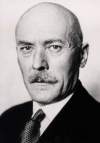


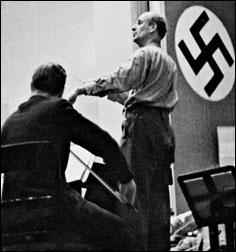
Albert Speer contacts the manager of the Berlin Philharmonic and tells him to change the program for the evening performance to include Wagner's Goetterdaemmerung. This is a signal to the groups' members that Speer will have transportation on hand after the performance to allow the 105 musicians to escape the fate Goebbels has planned for them; forced conscription in the Volkssturm. Speer has been planning this move to save the musicians for many weeks, but has been delaying it to allow the orchestra to continue their regular performances as a morale booster to the war-weary populace.
The plan is set in motion when Goebbels informs Speer that the time is near. When Speer protests against the move, Goebbels coldly replies: 'I alone raised this orchestra to its special level. My initiative and my money have made it what it has become, what it represents to the world today. Those who follow have no right to it.' Despite Speers' preparations, in the event only one member of the orchestra will take him up on it; the orchestra's conductor, Gerhard Taschner, and his family. The rest resolve to stay. (Read, Sereny) Nicolaus von Below will write of the occasion:
It was unforgettable. I sat with Speer and Admiral Doenitz and listened to Beethoven's Violin Concerto, the finale from the Goetterdaemmerung and Bruckner's symphony. Can there ever have been such a moment, such an experience? Silently the three of us walked afterwards across the totally destroyed Potsdamer Platz back to the Reich Chancellery. Annemarie Kemp will later tell Gitta Sereny:
What those who didn't attend didn't see were the baskets offered to spectators on the way out—cyanide capsules. Speer was just horrified. We never found out who organized it, but doubtlessly the party. The baskets were offered by Hitler Youths in uniforms—children. The subject of suicide was being constantly discussed ever since Hitler had declared his intention to kill himself if the war was lost. We heard that everybody around him said they would follow him. Speer said it was not only madness, but cowardly.
After the concert: When Speer returns from the concert, he finds the mood in the Fuehrerbunker ringing with the news that the American President, Franklin D. Roosevelt, is no longer alive. Hitler rushes toward him waving a newspaper: 'Here, read it! Here! You never wanted to believe it! Here it is! Here we have the miracle I always predicted. Who was right? The war isn't lost. Read it! Roosevelt is dead!'
Speer will later write that he was skeptical, but it seems certain that his Fuehrer's enthusiasm must have had some effect. Perhaps this death of a bitter enemy really will precipitate the long anticipated falling out among the Allies, the chance of which remains the only possible hope of saving the situation? If only the Miracle of the House of Brandenburg could be repeated, runs this last forlorn hope of the Nazis. Just after midnight an excited Goebbels, with a glass of champagne in his hand, rings up his Fuehrer: 'This is the turning point! It is written in the stars that the second half of April will be the turning point for us! This is Friday the thirteenth! Providence has struck down your most dangerous enemy. It is a miracle! It is like the death of Tsarina Elizabeth!' In the event, and quite contrary to these fantastic expectations, pressure from all sides continues unabated. (Read)
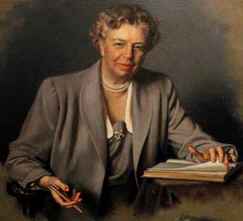
Churchill to Mrs. Eleanor Roosevelt:
Accept my most profound sympathy in your grievous loss, which is also the loss of the British nation and of the cause of freedom in every land. I feel so deeply for you all. As for myself, I have lost a dear and cherished friendship which was forged in the fire of war. I trust you may find consolation in the magnitude of his work and the glory of his name.
Churchill to Truman:
Pray accept from me the expression of my personal sympathy in the loss which you and the American nation have sustained in the death of our illustrious friend. I hope that I may be privileged to renew with you the intimate comradeship in the great cause we all serve that I enjoyed through these terrible years with him. I offer you my respectful good wishes as you step into the breach in the victorious lines of the United Nations.
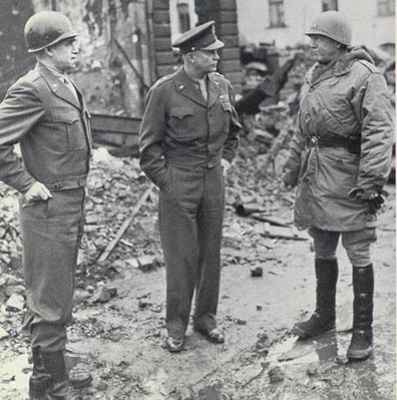
From Truman by David McCullough:
In a house at Marburg, Germany, three American generals, Eisenhower, Bradley, and Patton, sat up much of the night talking about Roosevelt and speculating on the sort of man Truman might be. All three were greatly depressed. 'From a distance Truman did not appear at all qualified to fill Roosevelt's large shoes,' Bradley wrote. Patton was bitter and more emphatic. 'It seems very unfortunate that in order to secure political preference, people are made Vice President who are never intended, neither by Party nor by the Lord to be Presidents.'
It had been an unusually difficult day for the three commanders, even before the news about Roosevelt. They had seen their first Nazi death camp, Ohrdorf-Nord, near Gotha. As they bid good night to one another, an aide recalled Eisenhower looking deeply shaken . . . . There were some, however, who, facing the prospect of a Truman presidency, felt confident the country was in good hands. They knew the man, they said. They understood his origins. They had seen how he handled responsibility and knew the inner resources he could draw on. As before and later in his life, Harry Truman was greatest among those who knew him best.
Death: Albert Voegler: leading German industrial tycoon and chairman of the board of the United Steel Works.
Along with Thyssen was one of the first industry bosses to funnel money to Hitler. In 1915 Voegler was appointed head of the German Luxembourg Mining AG and in 1925 replaced Emile Kirdorf as Chairman of the Rhineland-Westphalian Coal Syndicate. The following year he became head of Germany's largest steel works, Vereinigte Stahlwerke. In 1928 he began to fund the Nazi Party. He joined with other industrialists in signing the letter that urged Paul von Hindenburg to appoint Adolf Hitler as chancellor. This was successful and on 20th February, 1933, he attended the meeting with Adolf Hitler, Hermann Goering and Hjalmar Schacht where the Association of German Industrialists raised 3 million marks for the party in the forthcoming election. During the Second World War Voegler worked under Albert Speer the Minister of Armaments and was responsible for war production in the Ruhr. Albert Voegler committed suicide on this day following his arrest by American troops.
1946 Nuremberg Tribunal: Day 107: Ernst Kaltenbrunner is cross-examined by the Prosecution:
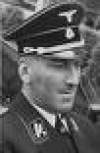
Kaltenbrunner: If, in your interrogation which you just read to me, I stated that I did not write this letter, then this is confirmed by the very figures which appear on top, where you read IV A 2 a, plus numerals and letters which obviously indicates that the letter was written in a section which was in charge of these matters. That is what I mean when I say that I did not write this letter. That it may have been submitted to me for my signature among thousands of other papers which I might have had to look into possibly in the course of one day, I cannot, of course, deny. From this, however, you cannot draw the conclusion that I undoubtedly knew about the matter. You cannot imagine the extent of the official functions which I took over in complete ignorance of police background, without instructions for carrying out police functions, but rather for organizing and directing the vast intelligence service. [For the full text of today's proceedings, Click here.]
From the diary of Mr. Justice Birkett: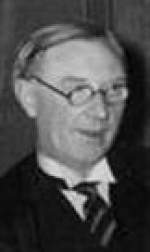
Kaltenbrunner is making a vigorous defense, denying his signature to documents of a most incriminating nature, endeavoring to show that he was really without power or influence. He is a fluent speaker and speaks with great animation and uses much gesture. In some matters he is no doubt right and it is then that he grows animated. Some of the things attributed to him are no doubt exaggerated, but it is impossible to think of the position accepted by Kaltenbrunner and, at the same time, to believe he was ignorant of so many matters. (Maser)
From the letters of Thomas Dodd:Friday, Kaltenbrunner was on direct exam in the morning and on cross in the afternoon. Amen did a miserable job—but the attitude of K(altenbrunner) made him look better than he was.
1949 Military Tribunal IV-A: Ministries Trial: Nineteen defendants, three Reich Ministers and eighteen other members of the Nazi party hierarchy, are found guilty of war crimes and crimes against humanity. Although appeals continue in this case until January of 1951, sentencing in the Ministries Trial brings an end to the four-year-long series of Nuremberg trials. (THP)
[See: Are There Any Lasting Effects From the Nuremberg Trials?]Edited by Levi Bookin (Copy editor) Click to join 3rdReichStudies Please note that the list-owner and the moderator are not responsible for, and do not necessarily approve of, the random ads placed on our pages by our web server. They are the unfortunate price one pays for a 'free' website. FAIR USE NOTICE: This site may contain copyrighted material the use of which has not always been specifically authorized by the copyright owner. We are making such material available in our efforts to advance understanding of historical, political, human rights, economic, democracy, scientific, environmental, and social justice issues, etc. We believe this constitutes a 'fair use' of any such copyrighted material as provided for in section 107 of the US Copyright Law. In accordance with Title 17 U.S.C. Section 107, the material on this site is distributed without profit to those who have expressed a prior interest in receiving the included information for research and educational purposes. If you wish to use copyrighted material from this site for purposes of your own that go beyond 'fair use', you must obtain permission from the copyright owner.
levi.bookin@gmail.com







